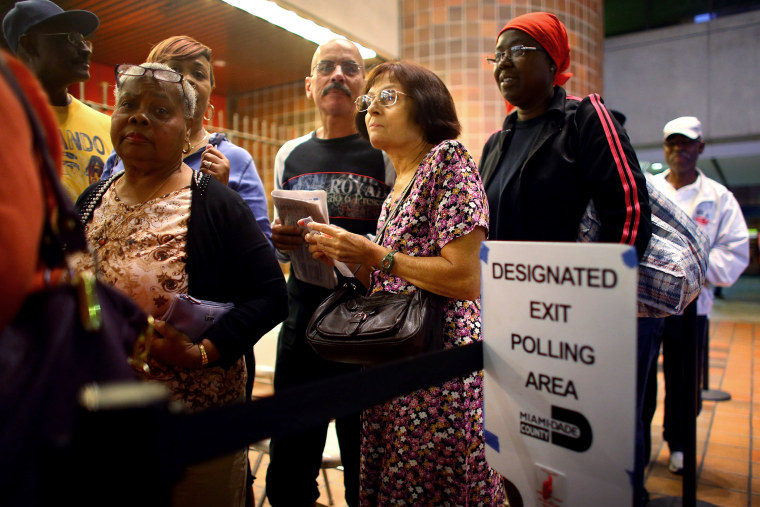Congress leaned toward a breakthrough on Thursday, as elder statesmen from both parties agreed on a plan to restore the Voting Rights Act of 1965.
Rep. John Lewis, who was beaten during the Selma march for civil rights in 1965, joined Rep. John Conyers, first elected that same year, and Rep. Jim Sensenbrenner, the conservative author of the Patriot Act and a longtime backer of the Voting Rights Act. They offered the first legislative response to the Supreme Court's decision gutting the law last year.
In June, the court invalidated parts of the Voting Rights Act because the law was not updated for current conditions. Chief Justice Roberts criticized Congress for using "40-year-old data" to patrol modern voter discrimination. That was peculiar logic, since most federal regulations sit on the books without updates. After all, laws aren't iPhone apps. Their power comes from permanence, not a constant refinement. As Richard Posner, a respected appeals judge, explained in a critique of the ruling, "ordinarily… a federal statute is not invalidated on the ground that it’s dated."
The upside, however, was that Roberts' complaint was eminently fixable. If the Justices wanted new data, Congress could just give it to them.
That's what the new bill does.
While the original law used literacy tests and turnout data from the civil rights era to pick which states required extra supervision to prevent discrimination, the "Voting Rights Amendments Act" uses more recent discrimination.
If a state is found to discriminate against voters five times, over a 15 year period, that conduct "triggers" federal supervision to protect the state's voters. There is a similar formula for local jurisdictions. Call it "five strikes and you're in."
Like the original law, this approach is measured – it only intrudes on local autonomy after democratic rights have been repeatedly violated. By using a more flexible trigger, it also enables federal supervision to go wherever the problem is – rather than focusing primarily on states with a history of segregation. That's a worthwhile shift, since legislative crackdowns on access to the polls has moved beyond the South and into states like Ohio and Indiana. (Legal commentators, myself included, proposed this kind of "national" trigger as one solution to the Supreme Court case last year.)
The bill also includes a "transparency" section to force more exposure on local voting practices. Since last-minute changes to voting rules can confuse voters or distort outcomes, the bill requires any change within six months of Election Day to be released through "public notice" and publication "on the Internet."
Professor Rick Hasen, an election law expert, says this "disclosure is an unmitigated good," and "allows for timely lawsuits if necessary to combat draconian voting changes throughout the country. "
The bill has a major hole, however, which speaks to the politics at play.
While the Supreme Court has upheld the concept of photo identification requirements to vote, some lower courts have rejected such rules, and the Justice department has also objected to voter ID laws. The bill attempts to exempt Justice department objections to voter ID in its new fomula for patrolling discrimination.
It states that violations based on Justice department objections to voter ID do not count toward the "five strikes" in the formula.
You read that right. There's an exception for a specific barrier to voting in a voting rights bill. On the other hand, proponents of the bill say its formula will still count any voter ID violations determined by a court, not the Justice department.
The provision is in there because last summer, wrangling over Voter ID almost broke up the bipartisan group that unveiled this bill. Sensenbrenner, the key Republican cosponsor and former Judiciary Chairman, was incensed that Attorney General Holder dubbed Voter ID a modern "poll tax" in July. Sensenbrenner publicly rebuked him for "politicizing" the issue. Then, when the Justice Department challenged Texas' Voter ID law in August, Sensenbrenner asked Holder to withdraw the suit – aggressively meddling in an enforcement action – while warning that the case would make it harder "to pass a bipartisan fix to restore the heart of the VRA." Many civil rights advocates thought the bipartisan road to reform hit a dead end.
Sensenbrenner, like many GOP lawmakers, strongly believed Voter ID rules were distinct from the kind of Jim Crow system, and voter suppression, that the Voting Rights Act targets. The fact is that Voter ID laws do have a disproportionate effect on certain citizens, especially minorities, the poor, and younger voters. Politically, many Democrats also view these barriers as a vindictive part of a "war on voting."
The new bill doesn't so much referee this debate as duck it. In its first substantive section, on page two, it strains to quarantine Voter ID infractions from the broader voting rights debate.
That's flawed policy which could make good politics. Sensenbrenner sounded much more positive this week, pledging conservative endorsements to come and invoking his conversations with Eric Cantor, the No. 2 Republican in the House.
That's critical, because while Speaker Boehner isn't known for bringing many reform bills to the floor, Cantor could upend this issue.
He traveled to Selma with Lewis for a recent anniversary, an experience he cited when reacting to the Supreme Court ruling by calling for a legislative response. And while many House Republicans are up for re-election in gerrymandered, increasingly monolithic districts, Cantor is not. Almost one out of five voters in his Northern Virginia district are African-American.
Cynics might say it all comes back to politics. But if the democratic will of a diverse electorate drives the GOP Majority Leader to act, it might be a good reminder of why this nation fought so hard to ensure everyone had the right to vote in the first place.
Editor's note:This story was updated 1/20/14 at 4:50 p.m. to clarify that the bill's voter ID exemption applies only to Justice objections, not court findings of voter discrimination based on voter ID.
